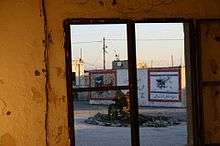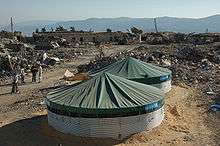Khiam detention center


The Khiam Detention Center, located near Khiam, Lebanon, was a French army barracks complex originally built in the 1930s. It became a base for the Lebanese army before falling under control of the South Lebanon Army (SLA), an Israeli-backed breakaway group of soldiers formed during the Lebanese civil war. In 1985 the base was converted into a prison camp that was used for torture and remained in use until Israel’s withdrawal from Lebanon in May 2000, and the subsequent collapse of the SLA. After the withdrawal, the prison camp was preserved in the condition it was abandoned and converted into a museum by the Lebanese government.
The Israeli Air Force destroyed the museum during the 2006 Lebanon War to hide the evidence of torture and mistreatment used there.[1]
Amnesty International[2] and Human Rights Watch[3] reported the use of torture and other serious human rights abuses in the facility.
Robert Fisk, the British journalist who has spent 25 years reporting from Lebanon, said about this prison:
“The sadists of Khiam used to electrocute the penises of their prisoners and throw water over their bodies before plunging electrodes into their chests and kept them in pitch-black, solitary confinement for months. For many years, the Israelis even banned the Red Cross from visiting their foul prison. All the torturers fled across the border into Israel when the Israeli army retreated under fire from Lebanon almost seven years ago.”[4]
“There was the whipping pole and the window grilles where prisoners were tied naked for days, freezing water thrown over them at night. Then there were the electric leads for the little dynamo — the machine mercifully taken off to Israel by the interrogators — which had the inmates shrieking with pain when the electrodes touched their fingers or penises. And there were the handcuffs which an ex-prisoner handed to me yesterday afternoon. They were used over years to bind the arms of prisoners before interrogation. And they wore them, day and night, as they were kicked — kicked so badly in Sulieman Ramadan's case that they later had to amputate his arm. Another prisoner was so badly beaten, he lost the use of a leg. I found his crutch in Khiam prison yesterday, along with piles of Red Cross letters from prisoners — letters which the guards from Israel's now-defunct "South Lebanon Army" militia never bothered to forward”. [5]
In some prison cells, there were small metal cages, torturers used to make the prisoners sit inside of them and then start hitting the cage from the outside, sometimes for hours, as a form of mental torture.[6]
Israel has denied any involvement in Khiam, allegedly claiming to have delegated operation of the detention camp to the South Lebanon Army (SLA) as early as 1988. The Israeli Defense Ministry acknowledged that personnel from Israel's General Security service "hold meetings several times annually with SLA interrogators" and cooperate with members of the SLA, and even assist them by means of professional guidance and training." It also admitted that Israel and the SLA "consult each other regarding the arrest and release of people in the Khiam facility."[7] In a court case brought by Israeli human rights lawyers, the Israeli Defense Ministry admitted paying staff at Khiam, training the interrogators and guards, and providing assistance with lie detector tests.[8]
See also
References
- ↑ "جريدة الدستور : بعد تدمير اسرائيل لمتحف "سجن الخيام" في الجنوب اللبناني * طلال معلا :التدمير الإسرائيلي للإبداع والفن الإنسانـي جريمة". www.addustour.com (in Arabic). Retrieved 2016-06-12.
- ↑ Letter from an Amnesty International delegation visiting the prison
- ↑ Human Rights Watch article on Khiam
- ↑ Inside a torturers' den, manacles lie abandoned
- ↑ "Robert Fisk: Inside a torturers' den". willzuzak.ca. Retrieved 2016-06-12.
- ↑ "معتقل الخيام: ذاكرة فوق الأنقاض". الأخبار (in Arabic). Retrieved 2016-06-12.
- ↑ "Israel Responsible for Abuses in Khiam Prison". Human Rights Watch. 1999-10-28. Retrieved 2016-06-12.
- ↑ "Israel accused". BBC. 2000-11-03. Retrieved 2016-06-12.
External links
| Wikimedia Commons has media related to Khiam detention center. |
- Khiam Official website
- Inside Lebanon's 'torture' prison (BBC, 27, May, 2000)
- Transcription of an interview with a prisoner (BBC, December 4, 2000)
- Panoramic view at 360 degrees of the Khiam Prison in Lebanon before being destroyed in July 2006.
- KHIAM PRISON - Israels Torture Den (InnovativeMinds - Report)
